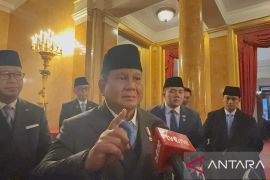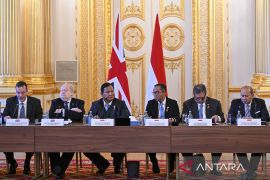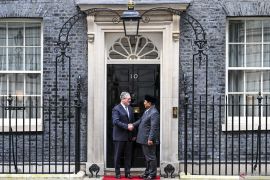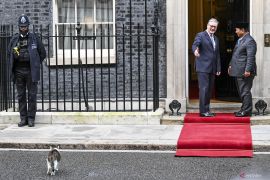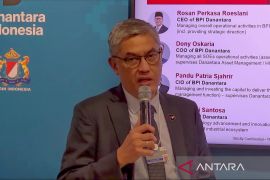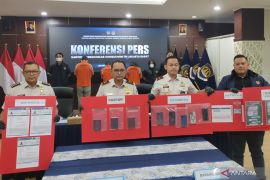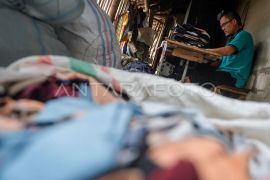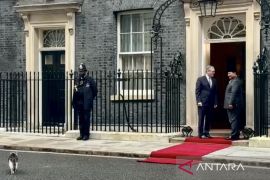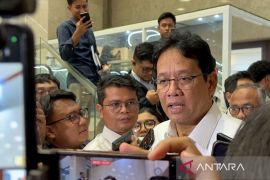"We would continue to push for sustainable world economic growth and a fairer global economic system," President Jokowi said.Jakarta (ANTARA News) - Indonesia has called for reform in global financial architecture in a number of international forums to create a sustainable economic growth.
Jakarta repeated the call again in G-20 summit in the Turkish city of Antalya in mid November this year.
"At the G-20 meeting Indonesia raised an important issue - reform of global financial architecture," President Joko Widodo (Jokowi) said.
Indonesia pushed for reform of global financial architecture at the summit meeting which promoted a theme of "Ensuring Inclusive and Robust Growth through Collective Action".
Jakarta has raised the same issue at the last Asian African summit meeting hosted by the country in April, 2015.
"We would continue to push for sustainable world economic growth and a fairer global economic system," the president said.
Other global issues raised at the meeting include climate change.
"Here Indonesia confirmed commitment to take part in joint action to deal with the impact of climate change," he said, adding Indonesia also attached importance to development of renewable energy in the world.
He said as the worlds largest Muslim country and the worlds third largest democracy, Indonesia spoke about its experience in maintaining pluralism.
The president cited a number of examples of success in developing harmony between Islam and democracy.
Toward the end of 2015, there are four world summit meeting -- G-20 in Turkey, APEC in the Philippines ASEAN in Malaysia, and "the 21th session of the Conference of the Parties to the United Nations Framework Convention on Climate Change" or the 21st COP UNFCC in Paris, France.
"As a big nation, Indonesias presence , role and voice carry great weight in the meetings," the president said.
The G-20 summit is especially important amid the heavy challenge of ailing world economy, marked with volatile financial market and falling commodity prices, he added.
President Jokowi said that dependence of the world on US dollar is potential to cause global economic turbulence.
"Too much dependence on a single currency has created global distortions threatening to block global economic development," he said.
He said it is time to overhaul the global financial architecture.
"Currently, the main problem faced by the world economy is U.S. dollar liquidity in almost all emerging markets," he said.
In addition since the use of euro in 1989, there has been no new "global reserve currency" , he said
The president said developi8ng countries should immediately implement economic reform fundamentally.
"Concrete economic reform is urgently needed to build up market credibility and regain the confidence of investors and economic players," he said.
Fundamental economic reform needs to be followed with strong financial liquidity to ward off turbulence as a result of liquidity problem, he said.
At the G-20 forum, Indonesia asked advanced nations to show example and support efforts to reduce carbon dioxide emission in the world.
"Each country should give commitment to ensure that the COP 21 in Paris would be a success," the president said.
Indonesia hopes that the result of the Paris meeting by the end of November 2015 is sustainable and fair, he said.
President Jokowi said as developing nation, Indonesia has taken a concrete step by stressing its commitment to reducing emission as mentioned in "Intended National Determined Contribution" (INDC).
The commitment of Indonesia is to cut emission by 29 percent in 2030 and 41 percent with international aid, he said.
He called in industrialized nations to support developing nation in coping with the impact of climate change.
Rich nation should increase financial support offering transfer of environmentally friendly technology,he added.
Indonesia reminded advanced nation of the need for financial aid of US$100 billion for developing nation in 2020 to cope with the impact of climate change.
The principle of "Common but Differentiated Responsibility" (CBDR) at the same time "Respective Capabilities" also have to be appreciated in the climate change agreement to be reached in Paris.
Indonesia asked all nations to provide political support for negotiators that agreement could be reached in COP21 and implemented immediately.
Indonesia called for international cooperation in fighting terrorism and extremism.
President Jokowi said conflicts in various regions have resulted in growing irregular migration creating serious challenges in Europe including in Turkey.
The problem could be settled by coping with the core of the problem including imbalance in development , continue violence and suppression and discrimination .
President Jokowi said Indonesian government has adopted a combination of "hard approach" of law enforcement and security and "soft approach" which is a cultural and religious approach to deal with extremism in the country.
As the worlds largest Muslim country and the third largest democracy, Indonesia serves as a laboratory showing that Islam, democracy and pluralism could go along well.
He said strong international cooperation regardless of political differences is a must in fighting extremism and terrorism.
The Indonesian government is ready to cooperate with any other countries to stamp out terrorism and develop tolerance.
Developing Countries
Meanwhile, Finance Minister Bambang Brodjonegoro said Indonesia spoke for emerging market related to call for reform of the International Monetary Fund (IMF).
No progress has been made toward reforming the Fund as the United States, its largest member is against the move for IMF reform.
"Indonesia takes the position to push for reform. This is for the interest of all as we want the IMF to be stronger and show more concern with the emerging market and developing countries," Bambang said.
The minister said Indonesia in the G-20 forum reminded advanced nations to adjust their monetary policy by considering the impact on developing nations.
"Indonesia wants that any country issuing a monetary policy to consider its global impact," he said.
He said the monetary stimulus of Quantitative Easing (QE) in 2008, proved to be false stimulus for global growth especially now the world is awaiting possible increase in fund rate of the US central bank .
"When the QE was stopped we saw the impact on global economic slowdown. The slowdown contributes to growing poverty and unemployment. We appreciate the importance of monetary policy, but the impact was not only on the financial sector but also political and social sectors," he said.
He said Indonesia also stressed on the importance of infrastructure financing to support global economic growth
"Indonesia would continue to push for the emergence of infrastructure financing. Infrastructure development is necessary to create a healthy economic growth," he added.
He said the agenda of infrastructure financing is in line with the result of the earlier meetings of G-20 which set a target of additional two percentage increase in the global economic growth in five years.
"Global growth this year is only around 3.1 percent and next year the growth to increase only to 3.6 percent . This is a heavy challenge, but it has been a commitment of G-20 to increase the growth to cope with social problems such as unemployment , poverty and imbalance," he said.
Infrastructure development could be a panacea to keep economic growth in the next five years to around four or 5 percent, especially there are already many multilateral agencies offering loan to finance infrastructure development, he said.
Indonesia has attached great importance to investment financing for infrastructure projects as the country is a "co-chairman of Investment and Infrastructure Working Group" in G20 together with Germany and Mexico.
G20 groups 19 big economies in the world plus the European Union. G20 was formed in 1999 as a forum which systematically gathers economic forces , developed and developing , to discuss important issues of world economy.
The first meeting of G-20 was in Berlin, from 15 to 16 December 1999.
The group accounts for almost 90 percent of the worlds gross national product (GNP) , 80 percent of worlds total trade and two third of the worlds population .
G-20 members include South Africa, the United States, Saudi Arabia, Argentina, Brazil, Britain , China, India, Indonesia, Italy, Japan, Germany , Canada , South Korea, Mexico , France , Russia, Turkey and the European Union.
In the G-20 summit in Turkey a number of non member countries attended .
Indonesia is the only ASEAN county having G-20 membership.
Head of the Presidential Communications Team Ari Dwipayana said among non member countries attending the G-20 meeting in Antalya, Turkey included Azerbaijan, Spain, Malaysia, Senegal, Singapore and Zimbabwe.
The opening ceremony of the summit meeting was attended by all heads of state of the member countries excepting Argentina and France.(*)
Reporter: Agus Salim
Editor: Heru Purwanto
Copyright © ANTARA 2015
